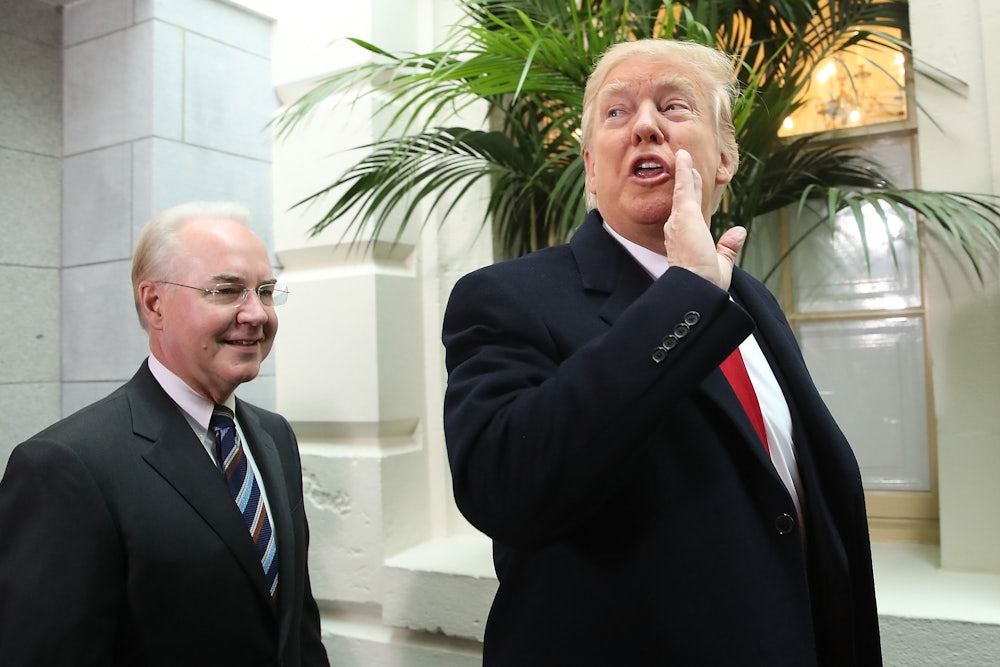A normal administration would take heed from the type of rebuke delivered Monday by FBI Director James Comey, who testified to Congress that there was no evidence for President Donald Trump’s claim that Barack Obama had him wiretapped last year. “With respect to the president’s tweets about alleged wiretapping directed at him by the prior administration, I have no information that supports those tweets and we have looked carefully inside the FBI,” Comey testified Tuesday. “The Department of Justice has asked me to share with you that the answer is the same for the Department of Justice and all its components. The department has no information that supports those tweets.” Equally troubling was Comey’s affirmation that there is an ongoing investigation, dating back to last July, into possible collusion between the Trump campaign and the Russian government.
Yet neither Trump nor his team took Comey’s words as a setback or even a reason to retreat from the accusation against Obama. When Press Secretary Sean Spicer was asked in his daily briefing if Trump was prepared to apologize to Obama, he responded, “No, we started a hearing. It’s still ongoing.” Spicer also maintained that “following [Comey’s] testimony, it’s clear that nothing has changed. Senior Obama intelligence officials have gone on record to confirm that there is no evidence of a Trump-Russia collusion. The Obama CIA director said so, Obama’s director of national intelligence said so, and we take them at their word.”
Spicer’s words were backed up by Trump’s own tweets, from two separate accounts, which similarly tried to dishonestly spin the day’s news in a way that supported the president’s narrative:
James Clapper and others stated that there is no evidence Potus colluded with Russia. This story is FAKE NEWS and everyone knows it!
— Donald J. Trump (@realDonaldTrump) March 20, 2017
FBI Director Comey refuses to deny he briefed President Obama on calls made by Michael Flynn to Russia. pic.twitter.com/cUZ5KgBSYP
— President Trump (@POTUS) March 20, 2017
Taken together, these tweets suggest that nothing will convince Trump to walk back his allegations against Obama. One reason might be that Trump sincerely believes these allegations. “People close to the president say Mr. Trump’s Twitter torrent had less to do with fact, strategy or tactic than a sense of persecution bordering on faith,” The New York Times reported. “He simply believes that he was bugged in some way, by someone, and that evidence will soon appear to back him up.”
But Trump’s allegations might also be a deliberate strategy to counter a long siege on the Russia story. The best way to shore up support for his presidency in the face of scandal is to cast the issues in as partisan a light as possible, so as to make it an issue about party loyalty rather than the truth.
While the Comey hearing was ongoing, Trump tweeted:
The Democrats made up and pushed the Russian story as an excuse for running a terrible campaign. Big advantage in Electoral College & lost!
— Donald J. Trump (@realDonaldTrump) March 20, 2017
This closely echoes the Nixon administration’s rhetoric in the early days of the Watergate scandal. On September 26, 1973, Pat Buchanan, then a presidential speechwriter, testified to Congress that “the election of 1972 was not stolen!” Rather, Buchanan argued, “the quality and character of our candidate” was the decisive factor.
Buchanan’s words resonated with many conservatives, including those who had disliked Nixon for such liberal policies as the opening to China, detente with Russia, wage and price controls, and a general acceptance of the welfare state. “That all changed with Watergate, which conservatives saw as a scandal trumped up by the liberal media to bring down a Republican president,” wrote Nicole Hemmer, a historian at the Miller Center of Public Affairs. “Those who once derided Nixon now rushed to his defense,” she added. North Carolina Senator Jesse Helms argued that Watergate, “by a process of selective indignation, became the lever by which embittered liberal pundits have sought to reverse the 1972 conservative judgment of the people.” These sentiments percolated through the culture. In 1973, a blue collar worker at a bar in Queens told journalist Gail Sheehy that the Democrats “couldn’t get themselves elected if they tried, so they’re picking on the number-one man.”
Nixon’s strategy of using partisanship as a shield worked to stave off impeachment— until the evidence of wrongdoing became so stark that even the most committed Republicans turned against him. On August 6, 1974, at a lunch with Senate Republican, former Republican presidential nominee Barry Goldwater reportedly said, “There are only so many lies you can take, and now there has been one too many. Nixon should get his ass out of the White House—today!” A day later, joined by GOP congressional leaders, Goldwater told Nixon how little support he had left on Capitol Hill. Nixon announced his resignation the following evening.
The Watergate precedent is a troubling one, as it shows that partisanship can slow down an unfolding scandal. Moreover, American politics in 2017 is much more polarized than it was in 1974. It’s by no means clear that the modern counterparts to Goldwater (if such figures even exist) would turn against Trump except under the most extraordinary circumstances. Given this, Trump’s decision not to back down from his allegations against Obama is a smart move to keep the Republican faithful on his side. A Fox News poll last week says it all: Whereas about six out of ten Republicans oppose an investigation into Russian interference in the election and possible collusion with the Trump campaign, 58 percent of them want Congress to investigate Trump’s wiretapping claim. When it comes to Trump versus Obama, the GOP base will always stick with Trump.
